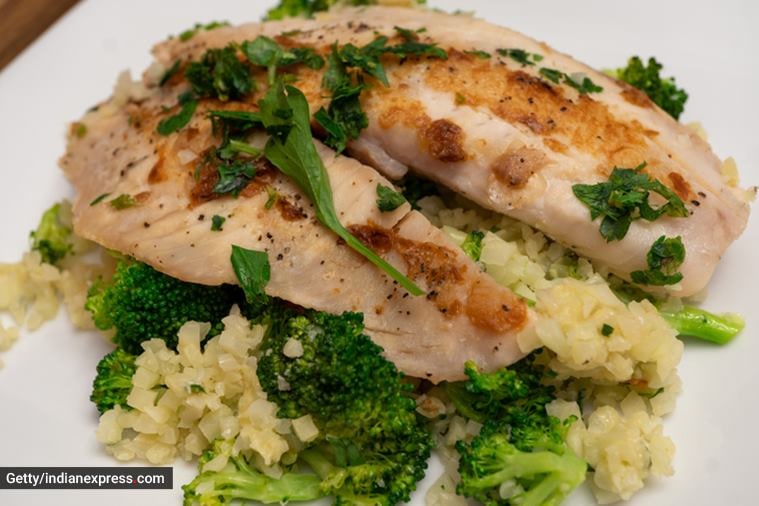- India
- International
National Nutrition Week: Can a plant-based diet help reduce the risk of Covid?
A plant-based diet that includes fruits and vegetables will increase the intake of essential minerals and vitamins that support the immune system, which may increase people’s resilience to Covid, says an expert
 Time to have healthy foods! (Photo: Getty/Thinkstock)
Time to have healthy foods! (Photo: Getty/Thinkstock)A recent study published by the online journal BMJ Nutrition – Prevention & Health showed that a plant-based and pescatarian (fish) diet could potentially reduce the risk of Covid infection. But to what extent is it true for the world population?
Minal Shah, senior nutrition therapist at Fortis Hospital, Mulund says that it is important to first understand the different kinds of diets and how they impact our health.
“A vegetarian diet is a healthy diet that may lower LDL cholesterol levels and blood pressure. It can reduce the incidence of hypertension, metabolic disease, including obesity and type-2 diabetes, and decrease the risk of death from ischemic heart disease,” she says.
What is a pescatarian diet?
According to the nutrition therapist, it is a vegetarian diet that includes fish or other aquatic animals. The word ‘pesce’ means ‘fish’ in Italian, and those who consume fish with plant-based diets have come to be called pesco-vegetarians or pescetarians.

“Meat-based diets usually have high saturated fat and salt content. Smoked and charred meat is also known to be carcinogenic (potentially cancer causing). At the same time, if a vegetarian diet is loaded with cheese, coconut, groundnut, or if one eats processed food like burgers, French fries etc., as meals, they can be equally harmful and unhealthy,” she warns.
Next come the pros and cons of vegetarian and pescatarian diets:
Vegetarian: Vegetarian diet is relatively healthy if people consume a high proportion of plant-based foods. These are rich in macronutrients, micro-nutrients, antioxidants and fibre. It is also ecologically sustainable in terms of greenhouse gas emissions. The concern is to ensure adequate amounts of proteins, limiting the intake of fat, sugar and avoiding processed food and alcohol. In a vegetarian diet, Shah says it is essential to identify the sources to ensure key nutrients like protein, zinc, omega-3 fatty sources, calcium, vitamin D, vitamin B12 and iron are met as per the Recommended Dietary Allowance (RDA).
 As per data, a pescatarian diet has a strong protective effect against colorectal cancers. (Photo: Getty/Thinkstock)
As per data, a pescatarian diet has a strong protective effect against colorectal cancers. (Photo: Getty/Thinkstock)
Pescatarian: This diet is similar to a vegetarian diet with the addition of fish and seafood. Fish is an excellent source of protein with a good quantity of healthy omega-3 fatty acids. Studies suggest eating two servings of fish per week may help reduce your risks of coronary heart disease. Omega-3 fatty acids help lessen plaque in the arteries that lowers the risk of arrhythmia. It can also lower triglycerides in the blood. As per data, a pescatarian diet has a strong protective effect against colorectal cancers. The concern is of the hazard caused by heavy metals like mercury. Skipping red meat may lower your iron intake. The diet can be expensive and difficult for people living away from coastal areas.
But, is there any connection with respiratory infections?
“Veganism itself does not reduce respiratory infections. It’s a vegetarian diet high in protein and low in carbohydrates. A plant-based diet that includes many fruits and vegetables will increase the intake of essential minerals and vitamins that support the immune system, which may increase people’s resilience to Covid,” says Shah.
She adds that SARS-CoV-2 alters the gut microbiota. And probiotics and prebiotics may improve the immune function in people with SARS-CoV-2 infection. “The fibre in plant foods provides prebiotics to gut bacteria. Plant-based diets influence the gut microbiome favourably, increasing bacterial diversity and potentially reducing inflammation.”
In the pandemic, everything that we eat matters. The expert warns that it is crucial to remember a vegan product may not necessarily mean health. That it is still advisable to check the nutrient density, vitamins, minerals, fats, added sugar of such products, etc.
📣 For more lifestyle news, follow us on Instagram | Twitter | Facebook and don’t miss out on the latest updates!
May 12: Latest News
- 01
- 02
- 03
- 04
- 05

























